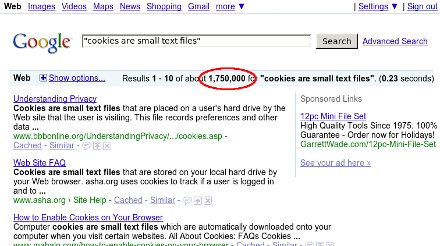"Cookies are small text files" -- what?
"Cookies are small text files which websites place on a visitor's computer."
I've seen this exact phrase hundreds of times, most recently on a site
that should know better,
The Register.

I'm dying to know who started this ridiculous non-explanation, and why they decided to explain cookies using an implementation detail from one browser -- at least, I'm guessing IE must implement cookies using separate small files, or must have done so at one point. Firefox stores them all in one file, previously a flat file and now an sqlite database.
How many users who don't know what a cookie is do know what a "text file" is? No, really, I'm serious. If you're a geek, go ask a few non-geeks what a text file is and how it differs from other files. Ask them what they'd use to view or edit a text file. Hint: if they say "Microsoft Word" or "Open Office", they don't know.
And what exactly makes a cookie file "text" anyway? In Firefox, cookies.sqlite is most definitely not a "text file" -- it's full of unprintable characters. But even if IE stores cookies using printable characters -- have you tried to read your cookies? I just went and looked at mine, and most of them looked something like this:
Name: __utma
Value: 76673194.4936867407419370000.1243964826.1243871526.1243872726.2
I don't know about you, but I don't spend a lot of time reading text that looks like that.
Why not skip the implementation details entirely, and just tell users what cookies are? Users don't care if they're stored in one file or many, or what character set is used. How about this?
Cookies are small pieces of data which your web browser stores at the request of certain web sites.
I don't know who started this meme or why people keep copying it without stopping to think. But I smell a Fox Terrier. That was Stephen Jay Gould's example, in his book Bully for Brontosaurus, of a factoid invented by one writer and blindly copied by all who come later. The fox terrier -- and no other breed -- was used universally for years to describe the size of Eohippus. At least it was reasonably close; Gould went on to describe many more examples where people copied the wrong information, each successive textbook copying the last with no one ever going back to the source to check the information. It's usually a sign that the writer doesn't really understand what they're writing. Surely copying the phrase everyone else uses must be safe!
[ 21:25 Dec 01, 2009 More tech/web | permalink to this entry | ]